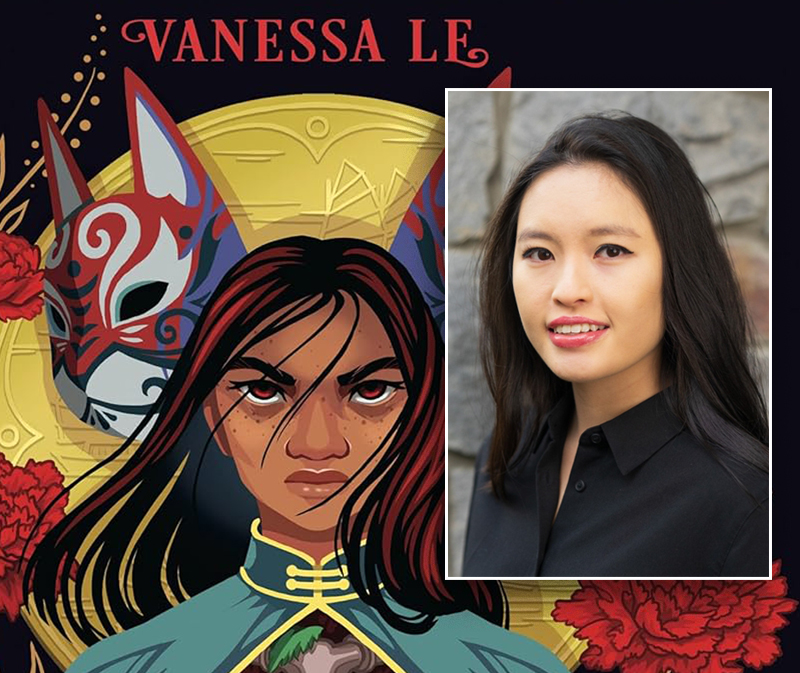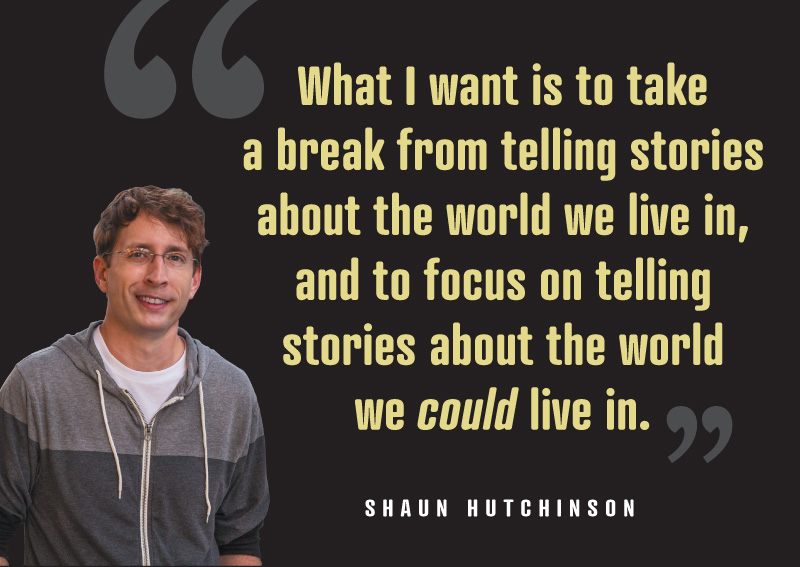What Makes a Monster? A guest post by Traci Chee

A Thousand Steps into Night started with a seemingly straightforward idea: A girl is cursed to turn into a monster. In the opening chapters, Miuko, a cis-gender girl of the serving class, is out running errands for her father when she is cursed to transform, little by little, into a bloodthirsty malevolence demon. When she is subsequently exiled from her failing village, she embarks on a journey to remove her curse and restore her humanity, which seems like a straightforward task until she realizes that there’s freedom in being a monster—freedom she never could have imagined—and it’s here that we find the true heart of the story, not in a straightforward adventure but in the more complex, more interesting question: What makes a monster?
In the novel, I gave Miuko blue skin and the supernatural ability to drain the life from any creature in the mortal or spirit realms, but this transformation is slow, creeping up her body like a rising tide, and the fact is, she’s treated as a monster long before these qualities manifest in her. People spit at her for riding a horse. They reject her for traveling without the company of a male relative. Doing these things in her oppressive, patriarchal society make her a threat to the social order, and her society reacts punitively, even violently, to force her back into her culturally-accepted role as an ordinary serving girl.
ADVERTISEMENT
ADVERTISEMENT
Although at first glance such restrictions may seem exaggerated, I don’t actually believe they’re that unusual. In American society, for example, it doesn’t take much for a cis-gender woman to be considered an aberration. Sometimes all she needs to do is speak her mind, or wear her hair a certain way, or not have children, or get a job in a male-dominated field, or believe in gender equality, and she’ll be criticized for it, demonized for it, made a monster for it.
Such restrictions don’t only apply to women either. In the United States, people of all genders are punished, in different ways, if they step out of the categories society has assigned to them. In this country, as in Miuko’s, sometimes all it takes to be considered monstrous is to be different.
But, as Miuko soon discovers, there’s power in being a monster. Over the course of her journey, she learns that rejecting the restrictions of her gender gives her freedoms she doesn’t want to give up. For the first time in her life, she can travel, she can voice her opinions, she can be as loud as she wants and take up as much space as she wants, and if that makes her monstrous, maybe being a monster is worth it.
Meanwhile, there’s a real monster stalking Miuko’s steps. The villain of this story is a handsome, brooding demon prince, who is in part a response to the trope of the handsome, brooding love interest: a figure who is menacing and violent, sometimes to the point of abuse, and yet somehow still alluring. But this demon is literally a demon—in his first conversation with Miuko, he suggests eating her and sexually assaulting her, and at every turn thereafter he seeks to isolate her, manipulate her, and exploit her for his own evil purposes. In stark contrast to Miuko, whose perceived monstrosity comes from challenging social precepts, the prince’s actual monstrosity lies in his cruelty and careless domination of others.
Despite this obvious monstrousness, however, I fear that some readers may be disappointed when the demon prince finally, unequivocally shows himself not to be a viable romantic partner but a ruthless tyrant who only seeks to connect with Miuko out of a desire to control her burgeoning power. And I wonder what this says about us, about our society, that a man—particularly a good-looking, wealthy, or well-positioned one, but not necessarily any of these—can get away with almost anything. In our society, a man can sexually assault a woman or shoot unarmed citizens or defraud people out of hundreds of millions of dollars, and he can still keep his job or be offered one or otherwise continue with his life without consequence. What does it say about us that it takes so very much for a man to be a monster, provided that he is acting in acceptably masculine ways, and so little for someone of a marginalized gender?
I think it says there is work to be done. In A Thousand Steps, Miuko must work to unlearn the restrictive gender conventions that have defined her entire life and to dismantle the patriarchal institutions that oppress her and others like her. For Miuko, this work takes place over the course of a cross-country adventure filled with extraordinary creatures such as magpie spirits, vengeance demons, and feral, bark-skinned gods, but it is my hope that even after the adventure ends and the story comes to a close, the work continues… both for Miuko, wherever her journey takes her next, and for us, on our own journeys in the world we are making together.
Meet the author

ADVERTISEMENT
ADVERTISEMENT
Traci Chee is the New York Times bestselling author of The Reader series and a National Book Award finalist. Her latest novel, We Are Not Free, was met with a Printz Honor and Walter Honor in addition to the NBA nomination and received four starred reviews. Northern California. www.tracichee.com, Twitter: @tracichee, Facebook & Instagram: @TraciCheeAuthor.
About A Thousand Steps Into Night
From New York Times bestselling author and National Book Award finalist Traci Chee comes a Japanese-influenced fantasy brimming with demons, adventure, and plans gone awry.
In the realm of Awara, where gods, monsters, and humans exist side by side, Miuko is an ordinary girl resigned to a safe, if uneventful, existence as an innkeeper’s daughter.
But when Miuko is cursed and begins to transform into a demon with a deadly touch, she embarks on a quest to reverse the curse and return to her normal life. Aided by a thieving magpie spirit and continuously thwarted by a demon prince, Miuko must outfox tricksters, escape demon hunters, and negotiate with feral gods if she wants to make it home again.
With her transformation comes power and freedom she never even dreamed of, and she’ll have to decide if saving her soul is worth trying to cram herself back into an ordinary life that no longer fits her… and perhaps never did.
ISBN-13: 9780358469988
Publisher: HarperCollins Publishers
Publication date: 03/01/2022
Age Range: 12 – 18 Years
Filed under: Uncategorized
About Amanda MacGregor
Amanda MacGregor works in an elementary library, loves dogs, and can be found on Twitter @CiteSomething.
ADVERTISEMENT
ADVERTISEMENT
SLJ Blog Network
One Star Review, Guess Who? (#202)
This Q&A is Going Exactly As Planned: A Talk with Tao Nyeu About Her Latest Book
More Geronimo Stilton Graphic Novels Coming from Papercutz | News
Parsing Religion in Public Schools
ADVERTISEMENT







